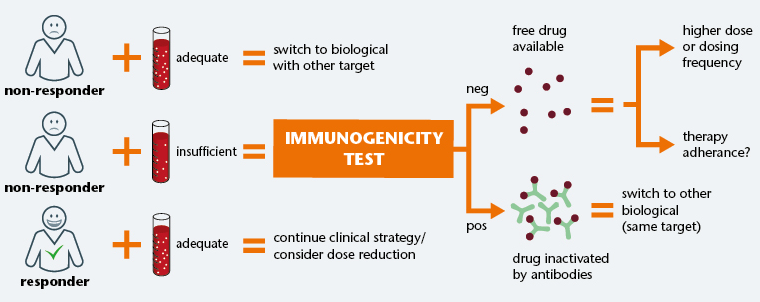
Personalized medicine
For treatment with the right biologic at the right doseMonitoring biologic levels in individual patients allows optimization of treatment efficacy by adjusting therapy depending on the specific response of the patient.
We believe that every patient should receive treatment from which he/she benefits optimally, thus treatment with the right medication and the right dose. Treatment should never needlessly endanger a patient's health or diminish quality of life. We therefore consider therapeutic drug monitoring of vital importance for all patients treated with biologics, as it contributes to making accurate and patient-specific treatment decisions.
Advantages of personalized medicine:

- Patients who respond better to the treatment are patients who feel better
- Reduced risk of adverse events that can harm the patient
- An accurate result in a cost-efficient and time-efficient manner
- More patients can be treated with biologics by saving on treatment costs
The figure below illustrates which treatment adaptations may be considered, depending on whether a patient responds well to therapy or not, and depending on the drug level measured in the individual. If drug levels are low in a non-responder, this may reflect formation of inactivating antibodies directed to the biologic treatment. Immunogenicity testing identifies presence of inactivating antibodies.

Decision-making example: When drug levels are decreased, the presence/absence of antidrug antibodies guides the next treatment step. In addition, reducing drug dosage in well-responding patients with relatively high drug levels cuts down cost.
Note: This is only a general scheme. Kinetics, dosing schedules and effective levels differ between biologics and diseases. If you have further questions, please contact Sanquin at [email protected] to discuss your results.

